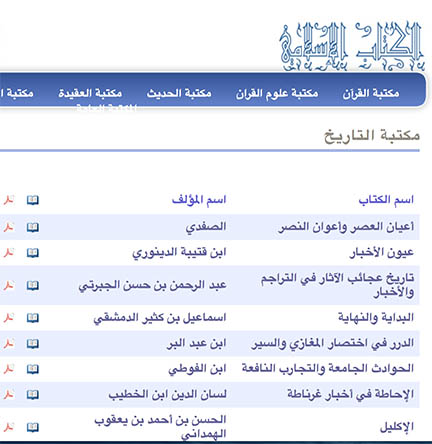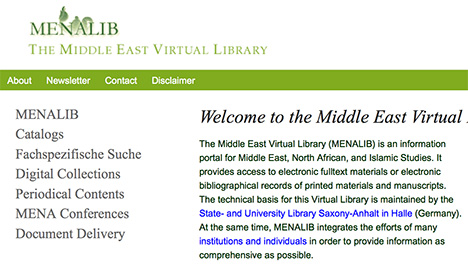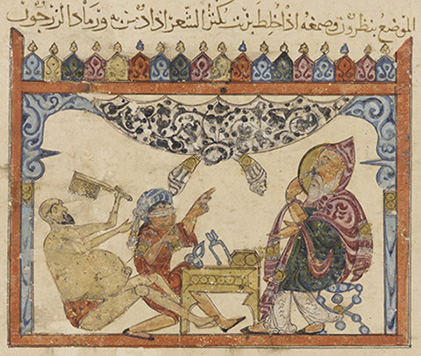MENALib is a major resource for find e-texts, manuscripts, etc.
Category Archives: Islamic Sciences
Digital Islamic Humanities Project
The Digital Islamic Humanities Project at Brown University is pleased to announce its third annual conference, titled “Distant Reading and the Islamic Archive,†which will be held on Friday, October 16, 2015.
Paper abstracts and the full event program may be found on the conference website (http://islamichumanities.org/conference-2015/).
Please note that event will be live-streamed over the web. You may access the webcast beginning tomorrow morning (Friday) at 9:00 am EST.
Speakers and paper titles:
David Vishanoff, “A Customizable Exaptive “Xap†for Charting Currents of Islamic Discourse across Multiple Bibliographic and Full Text Datasetsâ€
Peter Verkinderen, José Antonio Haro Peralta, and Hannah-Lena Hagemann, “Which Muḥammad? Computer-Based Tools for the Identification of Moving Elites in the Early Islamic Empireâ€
Alexander Magidow & Yonatan Belinkov, “Digital Philology and the History of Written Arabicâ€
Elias Muhanna, “Modeling Mannerism in Classical Arabic Poetryâ€
Maxim Romanov, “al-Ḏahabī’s Monster: Dissecting a 50-Volume Arabic Chronicle-cum-Biographical Collection From the 14th Century CEâ€
Seyed Mohammad Bagher Sajadi & Mohammad Sadegh Rasooli, “Automatic Proper Names Extraction from Old Islamic Literatureâ€
Karen Pinto, “MIME and Other Digital Experimentations with Medieval Islamic Mapsâ€
Nir Shafir, “Distant Reading the Material and Bibliographic Record of the Early Modern Islamic Archiveâ€
Eric van Lit, “A Digital Approach for Production and Transmission of Knowledge in Islamic Intellectual Historyâ€
Taimoor Shahid, “Mobile Ethics: Travel and Cosmopolitanism in the Islamic Archiveâ€
Astrology Conference
Library of Congress on the Near East

The Library of Congress has a very nice website with online resources regarding its collection of Near Eastern materials.
Darwin in Arabic

Here is a short review of an exciting new book:
Marwa Elshakry, Reading Darwin in Arabic, 1860-1950 University of Chicago, 2013.
by Carla Nappi on May 23, 2014, New Books in Science, Technology and Society
The work of Charles Darwin, together with the writing of associated scholars of society and its organs and organisms, had a particularly global reach in the late nineteenth and early twentieth centuries. Marwa Elshakry’s new book offers a fascinating window into the ways that this work was read and rendered in modern Arabic-language contexts. Reading Darwin in Arabic, 1860-1950 (University of Chicago Press, 2013) invites us into a late nineteenth-century moment when the notions of “science†and “civilization†mutually transformed one another, and offers a thoughtful and nuanced account of the ways that this played out for scholars working and writing in Syria and Egypt. The early chapters of Elshakry’s book focus on the central role played by popular science journals like Al-Muqtataf (The Digest) in translating and disseminating Darwin’s ideas. We meet Ya’qub Sarruf & Faris Nimr, young teachers at the Syrian Protestant College who were instrumental in translating scientific works into Arabic there and, later, in Egypt. An entire chapter looks closely at Isma’il Mazhar’s work producing the first verbatim translation of Darwin’s Origin of Species into Arabic, but the book also looks well beyond Darwin to consider broader Arabic discourses on the relationship between science and society, as those discourses were shaped by engagements with the work of Herbert Spencer, Ludwig Büchner, and many others. Elshakry pays special attention to the ways that this story is embedded in the histories of print culture, the politics of empire, and debates over educational reform, materialism, and socialism in the late nineteenth and early twentieth centuries, and concludes with a consideration of the continuing reverberations of these issues into late twentieth century Egypt and beyond. It is a must-read for anyone interested in the entanglements of science, translation, and empire in the modern world, and it will change the way we understand the place of Arabic interlocutors in the history of modern science.
A Literary History of Medicine
[The Wellcome Trust is generously funding a joint University of Oxford/University of Warwick publishing project online of an important 13th century medical text. Read about it below and on their website.]
KitÄb Ê¿UyÅ«n al-anbÄʾ fÄ« á¹abaqÄt al-aá¹ibbÄʾ
كتاب عيون الأنباء ÙÙŠ طبقات الأطباء
In the mid-13th century, a practising physician in Syria named Ibn AbÄ« Uá¹£aybiÊ¿ah set himself the task of recording the history of medicine throughout the known world. His book The Best Accounts of the Classes of Physicians covers 1700 years of medical practice, from the mythological beginnings of medicine with Asclepius through Greece, Rome, and India, down to the author’s day. Written as much to entertain as to inform, it is not only the earliest comprehensive history of medicine but the most important and ambitious of the medieval period, incorporating accounts of over 442 physicians, their training, practice, and medical compositions, all interlaced with amusing poetry and anecdotes illustrating their life and character. The ‘Herodotean’ breadth of the book reflects the geographical and cultural reach of the Islamic empire. Written by a man who was a medic and a poet, this highly readable history reflects considerable medical experience and lies at the interface of the serious medical practice of the day with society’s interest in biography and gossip.
The Wellcome Trust is generously funding a joint University of Oxford/University of Warwick project that will make this remarkable historical source available for the first time in a reliable and readable translation and study, as well as a critical edition of the text itself, resulting in a step-change in our knowledge of medical history in Medieval Islam. For nearly 300 years attempts to translate this monumental work have failed owing to the extraordinary range of skills needed to tackle it. This joint project is the first to assemble a team of senior and junior scholars with the required skills and interests to make it happen.
As work proceeds during the three- and one-half-year project, samples of biographical entries will be placed on this web page, with an opportunity provided for general discussion and comment.
Bringing Muslims back to science

Bringing Muslims back to science
Is Muslim religious discourse on scientific matters killing the scientific aspirations of the religious?
By Mohamed Ghilan, Al Jazeera, April 11, 2014
The most important rule in Islam is “judgment on anything is a branch of conceptualising it”. To determine whether a belief can be accepted by a Muslim or not, this is the first and most often repeated principle. However, when it comes to matters scientific, this indispensable rule for correct judgment is paradoxically the most disregarded one.
Ever since the decline of the Islamic civilisation and the end of its Golden Age, Muslims have ironically taken up superstitious and irrational thinking habits they had previously dropped when they originally accepted the Message of Prophet Muhammad. The ideas that the sun could eclipse for the death of someone, that certain numbers have magical powers, or that birds flying in a certain direction indicates an omen of some kind were among superstitious beliefs explicitly pointed out by Prophet Muhammad and in verses in the Quran for their irrationality. Unfortunately, it seems that Muslims have gone full circle. Out of the top 20 countries in overall science output, Turkey is the sole Muslim representative, barely sneaking in at number 19.
Overly simplistic explanations of this phenomenon have pointed to Al-Ghazali (c 1058-1111), one of the most influential Muslim theologians. His work, The Incoherence of Philosophers, is cited for its negative impact on Muslim thinking. This, however, is a grave misrepresentation of Al-Ghazali, his attack on contemporary philosophers, and the Islamic civilisation as a whole. Continue reading Bringing Muslims back to science
Arabic Books Online

In 1981, during a trip to Egypt, I bought the old multi-volume Cairo edition of the mother of all Arabic dictionaries: al-Zabidi’s Taj al-‘Arus. It took up an entire suitcase and was so heavy that I paid the porter extra. As I arrived home, the handle broke and the books spilled in the landing of my home. Those were the days when most Arabic books had to be physically bought in the Middle East and carried home in luggage. Books that used to be accessible only in major libraries are often available online today. If one is patient just about any classic Arabic text from the past is available online. Some are pdf scans, where there is a treasure trove at archive.org and 4.shared.com. It is usually best to search these sites in Arabic. But even a ouja-board Google search in Arabic can yield full texts.



